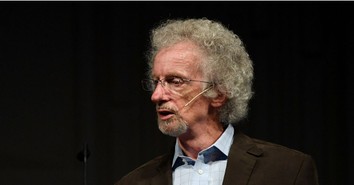Finding Healing after Sexual Abuse

Editor's Note: Pastor Roger Barrier's "Ask Roger" column regularly appears at Preach It, Teach It. Every week at Crosswalk, Dr. Barrier puts nearly 40 years of experience in the pastorate to work answering questions of doctrine or practice for laypeople, or giving advice on church leadership issues. Email him your questions at roger@preachitteachit.org.
Dear Roger,
I have a problem and don't know how to help myself. When I was about 6 or 7-years-old, I was sexually molested. For a long time, I did not think of it. It was like I blocked it out of my mind, but now it is affecting me and my marriage. I finally told my husband about it and he wants to help me with this, but doesn’t know how and neither do I. I just want it to go away before my marriage does. Can you help me, please?
Dear Name Withheld,
My youngest daughter was sexually abused by an Argentine exchange student when she was 16. Like so many victims, she kept the experience hidden. Some years later we noticed that she occasionally acted strangely around boys. We never figured out why until she joined the fencing team in college.
One evening she told us how she sometimes liked to aim her rapier (fencing sword) at her opponent's (male) private parts and thrust hard. It wasn't long until the whole, ugly, devastating story spilled out all over the kitchen table.
Thank God for Anne. Anne specialized in helping sexually abused women find healing and wellness. Today, our youngest is happily married, has a great job and is enjoying life.
I can’t tell you how much I grieve for you. What happened was so unfair and ugly. I’m not surprised that you banished the memories from your mind.
Several years ago one of our counselors and I surveyed a women’s Bible class of over 100 women and were shocked by the results. Fully 42% of the women in the room reported some form of sexual abuse before the age of 16.
You are not alone.
Fortunately, healing and relief are available.
Like my daughter who "acted out," many sexual abuse victims discover a number of feelings and emotions that will need healing along the way.
Before we talk about strategies for healing, let me share a few of the struggles you may encounter.
When we get hurt, the next emotion we feel is always anger. The hurt of your abuse is merciless. Somebody has stolen your happiness, and part of your life is missing. Don’t be surprised when you struggle in both of these areas.
You may find yourself angry with God. Once I was counseling a young rape victim who spit out the question: “Where was Jesus Christ when I was being raped at 14?" The abuse began with her father and expanded to include several of his friends.
If her question is not answered properly she may find herself unable or not wanting to look for God’s help as she works on her healing---or wanting nothing to do with him at all.
I looked at her with compassion and said, “We live in a fallen world and you were betrayed by the very persons Jesus brought into your life to care for and protect you. In a fallen world people do dastardly things. Fortunately, Jesus is in the business of helping us pick up the pieces, get healed, and get on with our lives.
Many counselors discover that almost all victims feel responsible and guilty for the abuse—especially those abused as children. These feelings often result in tremendous shame accompanied with a deep sense of worthlessness and self-condemnation.
You may discover your trust in men begins eroding away. Either consciously or subconsciously, all men are potential threats.
You may struggle with relationships, especially if a relationship becomes too personal and intimate. It is not uncommon for victims to sabotage the relationships they desperately need.
Many begin to neglect personal looks and hygiene, often subconsciously, to make themselves unattractive to boys (men) because of their fear of ever again trusting a male or having a relationship with one.
Many try to "wall off" the experience and ignore it or live as if it never happened, or in your case, the trauma is so painful, the brain buries it so deeply you can't even remember it happened.
Unfortunately, for those who have buried deeply the abuse, the inner poison often begins to ooze out about the age of 35 or 40. All hell can break loose in a marriage
Those married to abuse victims often feel they are “walking on eggshells” around their spouse. I call these minefields. The triggers are often unknown to either partner; but when one is stepped on, the resulting explosion hurts everyone.
The husband may do or say something rather nondescript and suddenly the wife explodes with anger. She doesn't know why? He is hurt and can't understand what he did. An argument ensues.
The husband and his wife need to understand that when she erupts over something seemingly small and innocuous her husband just stepped on a mine.
Fortunately, you can clear out the mine fields as you progress in your healing.
You are fortunate, your husband wants to understand and help. Your concern about the threat to your marriage is not unusual.
You are right when you say neither you nor your husband knows what to do. In my experience sexual abuse, childhood abandonment and/or neglect are the “big three” that need special counseling attention. Most life issues can be addressed by a competent counselor—except these three. Only an expert with much wisdom, experience, and spiritual sensitivity can help you navigate the treacherous water to safety.
Search until you find, “Anne.” Anne specialized in helping abuse victims get well. Anne saved my daughter and a good Anne can save you.
If you can’t afford a counselor or if you are unable to locate one near you, then I encourage you to secure one of the many books on sexual abuse available on line. Also, many bookstores have books that specialize in helping abuse victims recover. Let me suggest several.
The first one is written by a Christian woman from a Biblically-Christian perspective. I recommend that you read hers first. “Healing Victims of Sexual Abuse,” by Paula Sandford carefully intertwines Biblical principles with the tools that allow victims to put the abuse behind them—and leave it there—as well as the tools for becoming whole again. I suppose that this book is the most widely read book on healing sexual abuse that has ever been written.
“Beginning to Heal: A First Book for Survivors Of Child Sexual Abuse,” by Ellen Bass and Laura Davis, is specifically designed for victims who are not quite ready for the intensity and scope of other sexual recovery books. “First Book” is a basic, easy to read, introduction to the recovery process.
“The Right To Innocence: Healing The Trauma Of Childhood Sexual Abuse,” written by Beverly Engel, is also a good starting place to initiate healing. Engel is a therapist who has suffered sexual abuse herself. She uses visualizations and exercises in her well written and practical book for restoration.
“The Sexual Healing Journey: A Guide for Survivors of Sexual Abuse,” by Wendy Maltz and Carol Arian takes a sensitive and helpful practical approach you might find refreshing.
Spouses and family members can have a large part in promoting sexual abuse recovery. “Partners in Recovery: How Mates, Lovers & Other Survivors Can Learn to Support & Cope With Adult Survivors of Childhood Sexual Abuse,” also by Beverly Engel, is a useful resource. Also helpful is “Allies In Healing: When The Person You Love Was Sexually Abused As A Child, A Support Book” by Laura Davis.
We usually think of sexual abuse victims as being female. Of course, boys and men can also be victims. They need healing, too. “Abused Boys: The Neglected Victims Of Sexual Abuse,” by Mic Hunter examines the physical and emotional impact of abuse and the factors affecting recovery. This study explains the ways in which boys are molested and the reasons why men remain silent about it later in life.
I think, Name Withheld, that the more your husband engages spiritually, emotionally and intellectually he will have a special part in your recovery. His patience and understanding are critical. His willingness to learn the extent of your past emotional train wreck and his loving support will go a long way to facilitate your healing. Right now you are a wounded animal who needs sensitive care. He needs to handle you with soft lovingly gloves of comfort and patience when you fall into guilt or depression or erupt with anger!
Remember that you are not the only one who is hurt by your recent revelation of childhood molestation. Your husband is also devastated. He is like a wounded animal, too. Part of your healing is to help him with his. Cut him some slack; be patient with him as he sorts out his feelings about the emotional bomb which just landed in his marriage. He needs comfort and healing, too.
We thank God that our Lord Jesus Christ is the all-time best healer of broken hearts.
He healed the broken heart of the woman at the well who was on her sixth live-relationship in John 4.
He forgave and restored the woman who was caught in the act of adultery in John 8.
He so well restored the prostitute Mary Magdalene that God granted her the privilege of being the first individual to see the open tomb and the resurrected Christ.
Again, in John 8 Jesus teaches that He is forever in the business of picking up the pieces of our broken lives and helping us to start over again.
In Joel 2 God says that He can supernaturally restore again the years the “grasshoppers have eaten away.”
Somewhere along the line you will need to deal with forgiveness. Don’t be in a hurry to think that you have to do this immediately. You have a lot to work through before you may feel that you want to address this issue.
Let me give you a few reminders of what forgiveness might look like.
- Forgiveness doesn't mean that what happened was okay.
- Forgiveness doesn't mean that what happened is forgotten.
- Forgiveness doesn't mean that everything returns to the way it was before the perpetration.
- Forgiveness especially doesn't mean that family members should excuse the wrong behavior because they are “family.”
- Forgiveness doesn't mean that we should hide, or not talk about the abuse or shy away from conflict by not talking about the abuse.
- Forgiveness does not mean that if we "truly" forgive, we will "trust" each other implicitly. A sacred trust is broken, it takes time (often years) to rebuild trust with your abuser. Frankly, my experience is that such trust seldom is restored.
- Forgiveness does not mean that we are "letting them off the hook" for the injustice of what they've done. They are still on God's "hook" and vengeance belongs to Him.
You know you have forgiven when you don’t want to hurt or see them hurt anymore.
Again, Name Withheld, I grieve with you for what someone did to you when you were young. I have already prayed for your healing—and will continue to do so. May God grant you great progress and total healing. May your husband be your rock and comforter as you continue getting well.
Let me know how it all turns out.
Love, Roger

Publication date:
Originally published August 14, 2013.







